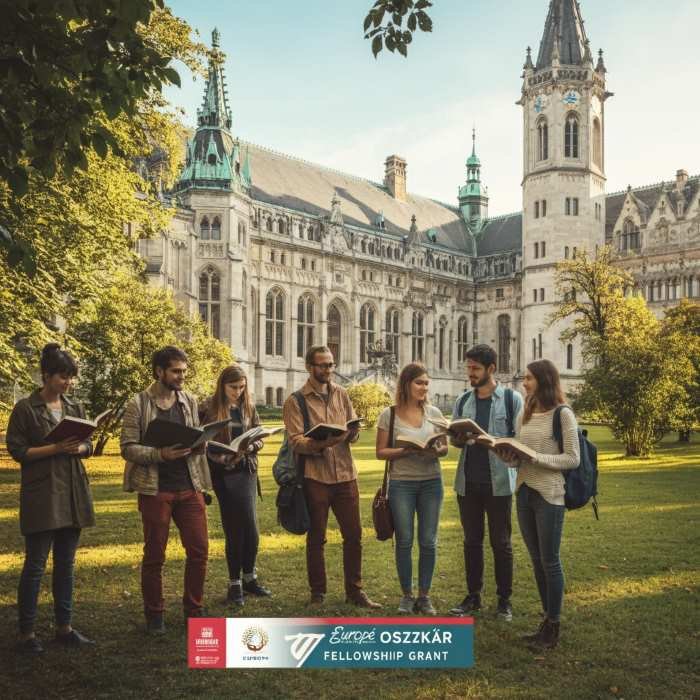In the heart of Europe’s thriving academic and cultural network, the Europe Oszkár Sárkány Fellowship Grant 2025 emerges as a prestigious opportunity for scholars, researchers, and cultural historians passionate about the intersections of anthropology, history, and Eastern European cultural studies. Named in honor of the renowned Hungarian anthropologist Oszkár Sárkány, this fellowship program is designed to support scholars whose work bridges disciplinary boundaries and seeks to illuminate the complexities of Central and Eastern Europe in both historical and contemporary contexts.

About Oszkár Sárkány and the Fellowship’s Vision
Oszkár Sárkány (1946–2017) was a distinguished anthropologist and scholar whose work reshaped the way Europe understands cultural identity, tradition, and transformation in post-socialist societies. His research delved deep into the cultural and social shifts in Central and Eastern Europe, particularly in Hungary, Romania, and the Balkans. Known for his ethnographic approach and interdisciplinary insights, Sárkány championed nuanced interpretations of cultural memory, minority rights, nationalism, and the politics of identity.
The fellowship bearing his name is an homage to his legacy. It aims to nurture new generations of scholars who will carry forward his intellectual tradition, deepening our understanding of the evolving cultural landscapes of Europe—especially in post-1989 transformations.
Fellowship Objectives
The Europe Oszkár Sárkány Fellowship Grant 2025 is crafted to:
- Encourage innovative, interdisciplinary research in anthropology, sociology, history, political science, and cultural studies focused on Central and Eastern Europe.
- Support both early-career and established researchers conducting fieldwork or archival research in Europe.
- Promote cross-border academic collaboration among European institutions and scholars.
- Contribute to public and academic discourse on themes such as identity politics, memory, migration, minority issues, religious pluralism, and post-socialist transitions.
Fellowship Structure and Benefits
Successful applicants will receive the following:
- Financial Support: A grant of up to €15,000, disbursed in stages aligned with research milestones. This funding is designed to cover travel, accommodation, research materials, and subsistence.
- Duration: The fellowship tenure is 3 to 6 months, flexible depending on the proposed research plan.
- Institutional Affiliation: Fellows may choose to be hosted by one of the program’s European partner institutions, such as Central European University (Vienna), Eötvös Loránd University (Budapest), the University of Bucharest, or the Polish Academy of Sciences. These host institutions offer access to rich archives, libraries, and academic mentorship.
- Mentorship & Networking: Fellows will be paired with a senior academic in their field, ensuring personalized feedback and guidance. They will also participate in research seminars, conferences, and workshops throughout their tenure.
- Publication Support: Outstanding projects may be offered support for publication in academic journals or as part of the fellowship’s curated monograph series on “Culture and Change in Central Europe.”
Who Should Apply?
The fellowship is open to scholars from around the world, with a clear focus on Europe, particularly Central and Eastern Europe. Eligible candidates include:
- PhD students in the advanced stage (who have completed coursework and are working on their dissertation).
- Postdoctoral researchers within 5 years of earning their PhD.
- Independent researchers with a substantial record of publications.
- University Faculty are working on relevant topics.
Disciplines encouraged to apply include anthropology, sociology, political science, history, cultural studies, and area studies.
Research Themes
While the fellowship is open to a wide range of topics, priority will be given to projects addressing the following:
- Post-socialist Transformations: How do nations and communities in Central and Eastern Europe reckon with their socialist pasts?
- Cultural Identity & Memory Politics: The role of museums, monuments, and public history in shaping national identity.
- Minorities and Migration: Roma studies, refugee movements, integration challenges, and diaspora communities.
- Religion and Secularism: The place of religion in contemporary European politics and culture.
- Populism and Nationalism: Rising political currents and their effects on marginalized communities and academic freedom.
- Urban Anthropology: The cultural life of post-industrial cities in transition.
- Youth and Resistance: Activism, political engagement, and cultural expression among young Europeans.
Application Process
Applications must be submitted by 15 September 2025 via the fellowship’s online portal. Incomplete or late submissions will not be considered.
Required Documents:
- Research Proposal (max 5 pages): Clearly outlining the project’s objectives, methodology, and relevance to the fellowship themes.
- Curriculum Vitae (max 3 pages): Including academic background, research experience, and publication list.
- Letter of Motivation (max 1 page): Explaining why the candidate is applying and how the fellowship aligns with their goals.
- Two Letters of Recommendation: Preferably from academic mentors or collaborators.
- Proposed Budget and Timeline: A simple breakdown of how the grant will be used and over what period.
Shortlisted candidates may be invited for an online interview in late October 2025. Final decisions will be announced by November 15, 2025. Fellowships will begin from January 2026 onwards, depending on availability and host institution preferences.
Impact and Legacy
Previous recipients of the Oszkár Sárkány Fellowship have gone on to publish groundbreaking books, influence public policy debates, and teach at leading universities. The program’s alumni network is a testament to the enduring value of rigorous, field-based research rooted in empathy and cultural understanding.
Fellows are encouraged not just to engage in solitary research but to give back—by conducting lectures, writing blog posts for public dissemination, and participating in community engagement projects in their host countries.
Why This Fellowship Matters Today
In an age marked by political polarization, historical revisionism, and cultural amnesia, the Europe Oszkár Sárkány Fellowship Grant 2025 provides a vital platform for scholars who believe in the power of research to challenge dominant narratives and give voice to the marginalized. By investing in thoughtful, independent scholarship, the fellowship not only honors Oszkár Sárkány’s legacy—it actively helps shape the future of cultural and social research in Europe.
With its focus on interdisciplinary methods and its openness to critical perspectives, this fellowship fosters a generation of researchers who are not afraid to ask difficult questions, engage with communities, and envision a more inclusive Europe.
Final Thoughts
If your research is rooted in the lived realities of Central and Eastern Europe and you’re eager to pursue fieldwork, collaboration, and critical scholarship, the Europe Oszkár Sárkány Fellowship Grant 2025 offers a once-in-a-lifetime opportunity to take your work to the next level.
Apply by 15 September 2025, and become part of a scholarly movement dedicated to understanding and transforming Europe from within.
More Scholarships?
Toronto Metropolitan University Future Leaders Fellowship | Study in Canada
Trinity College Dublin Global Excellence Postgraduate Scholarships | Study in Ireland
University of Otago Master’s Scholarships for International Students
Dean’s Award for Academic Excellence – University of Bath Scholarships




